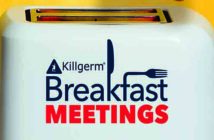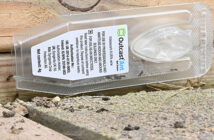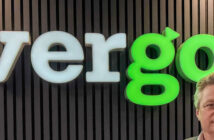East Coast Pest Control based in Hunmanby near Filey on the East Yorkshire coast has become the latest British company to achieve CEPA certified status and prove that they are meeting the European standard (EN 16636) in pest management service. They join an elite, and increasing, group of UK pest control businesses choosing to demonstrate their professionalism in this way.
| East Coast Pest Control’s success at becoming the 30th UK company to be CEPA Certified coincided with the most recent British Pest Control Association (BPCA) CEPA certified breakfast roadshow, which was held at the BPCA offices in Derby on Tuesday 24 May.
Six years ago the European pest management industry set about creating an official European Standard for pest management services. One of the main drivers was to protect the sector from having an arbitrary standard, written by people with no knowledge of the industry, imposed on it. It was a truly Europe-wide effort with more than 200 individuals from 18 countries contributing their skills. The European Standard EN16636 was finally published in March 2015. |
||
| Like all European Standards any company/individual can use it (or claim to be following it) but what turns it into something of true value is a proper auditing system to guarantee the quality of work and keep the cowboys out. This is where CEPA, the Confederation of European pest management associations, based in Brussels and CEPA Certified comes in. Read more about the launch of CEPA Certified.
Interestingly, despite the UK’s reservations about the EU and the current debate about Brexit, it is UK companies which, so far, are leading the way in showing their adoption of the new standard by going through the certification process. |
|
|
| The country currently second in the ‘take-up league’ is Italy with 13 companies listed in the CEPA Certified web directory.
So why is it UK companies that are leading the way? However, perhaps the biggest driver of all is the accessibility BPCA members now have to achieve certification through their membership. BPCA has created a cost effective model through which all members are being audited by an independent body, Bureau Veritas (BV), to assess conformity to the EN 16636:2015 standard. Over an18 month period inplace of the old BPCA assessment, the association is paying for all members to be independently audited by BV. Members then have the option to progress with certification. BV is a world leader in testing, inspection and certification services, employing some 66,000 people in 1,400 offices and laboratories all over the world. As Simon Forrester explained: “This is the next step in the professionalisation of the industry. Through BASIS Prompt and CPD all technicians within member companies can now show their professionalism. Now, all member companies are going through the new external audit process so, by June 2017, we will also be able to say that all our companies operate to the European professional standard.” Whilst the audit is paid for through the BPCA membership fee, companies who want to go all the way and become CEPA Certified do have to part with their hard earned cash. For most small businesses it works out at £500 a year, £1,500 in total as the CEPA Certified status last for three years. There is a shorter interim surveillance audit which must take place between 12 and 24 months into the three year cycle, allowing those who have other certifications e.g. ISO9001 to marry up the audits and save money. As BPCA chief executive Simon Forrester pointed out, £500 a year is just £1.37 a day. Henry Mott, managing director of Conquer Pest Control, explained how achieving certification to EN 16636 is allowing his company to compete with much bigger pest management businesses. “There are a lot of client companies looking for uniform service across all their sites,” he explained. “Before this standard came about there were only a few pest control companies that these clients could look to but now with CEPA certified you can approach these potential clients and because you are working to the same European standard as the big companies there is no reason why they shouldn’t appoint you to look after specific sites. It opens up a huge potential market for smaller pest control businesses.” |
||
| Pest also spoke to Andy Hunn from East Coast Pest Control about why he felt it was important to go the extra mile and become CEPA certified.
He said: “We pride ourselves in having led the way in this part of the world. We were the first small pest control company in this area to be BPCA accredited and we always try to keep ahead of the competition and show our professionalism. Becoming CEPA certified is helping us do that.” |
|
|
| He added: “We only have four technicians but they are all trained in-house to RSPH level and are all part of BASIS Prompt. We see education, training and high standards of service as the basis of our business.”
The next BPCA CEPA seminar is in Central London on1 June 2016, followed by Bristol on 28 June and Knaresborough on 21 July. Download a list of the first 30 UK companies to become CEPA certified. A brochure from Bureau Veritas on EN16636 and CEPA certified is included in the Pest library. |
||

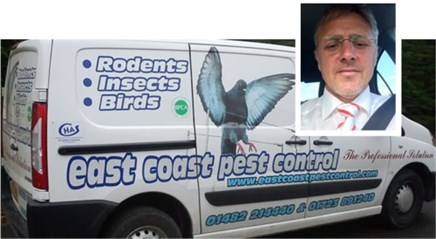
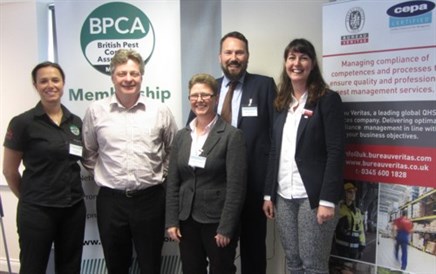 Speakers at the CEPA Certified breakfast seminar from left: “Natalie Bungay (BPCA), Henry Mott (Conquer Pest Control), Dee Ward-Thompson (BPCA), Simon Forrester (BPCA) and Jessica Morgan (Bureau Veritas)
Speakers at the CEPA Certified breakfast seminar from left: “Natalie Bungay (BPCA), Henry Mott (Conquer Pest Control), Dee Ward-Thompson (BPCA), Simon Forrester (BPCA) and Jessica Morgan (Bureau Veritas)